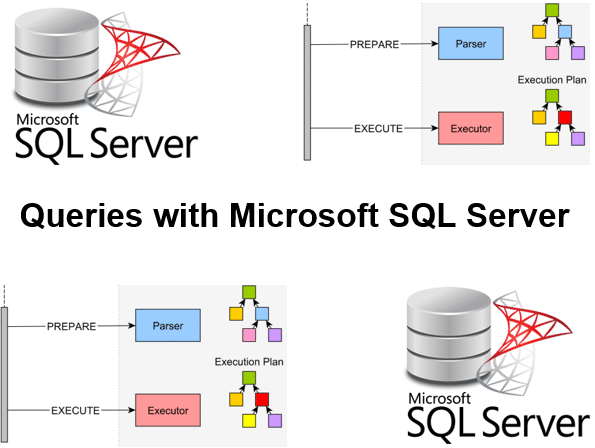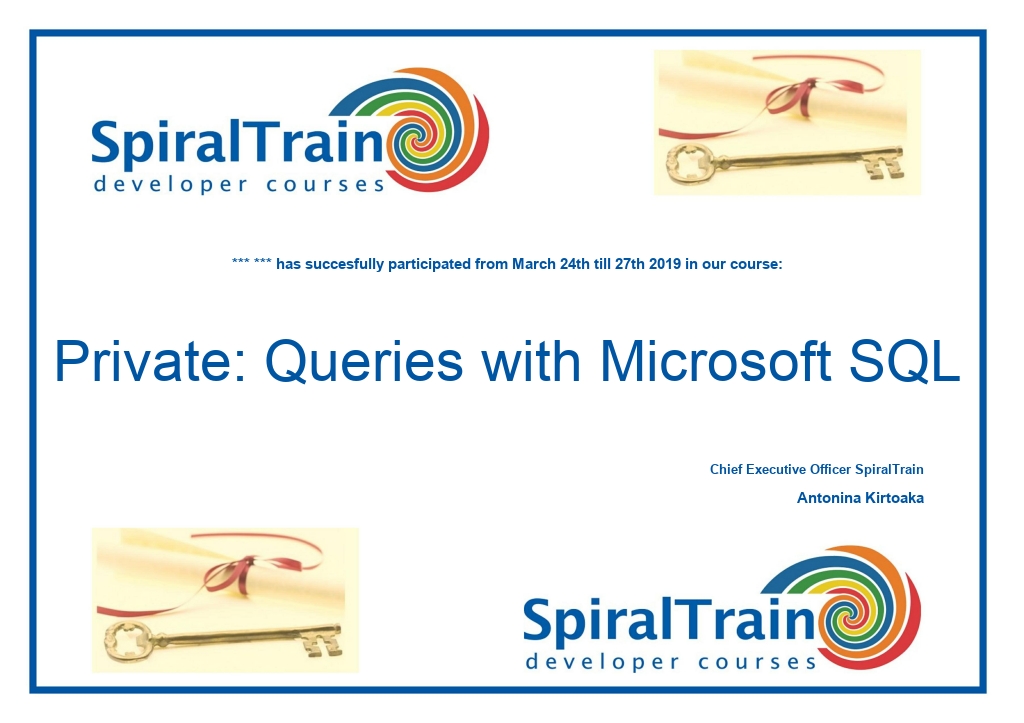-
Learning by doing
-
Trainers with practical experience
-
Classroom training
-
Detailed course material
-
Clear content description
-
Tailormade content possible
-
Training that proceeds
-
Small groups
In the course Queries with Microsoft SQL Server, participants learn the syntax and use of the query language SQL in the context of a Microsoft SQL Server database. SQL is an ANSI and ISO standard Query language that is applicable in all relational database management systems (DBMS). With SQL you can both retrieve and modify data in Microsoft SQL.
After an introduction to relational databases, the SQL standard and Microsoft SQL, the Microsoft SQL Server installation, environment and tooling are discussed. Like other DBMS systems, Microsoft SQL Server has added extra features of its own to standard SQL and these are also discussed in the course.
In the first place, it will be discussed how SQL statements can be created and executed in Microsoft SQL Server. Subsequently, the various components of SQL are discussed step-by-step, such as Data Definition Language with CREATE TABLE and Data Manipulation Language with INSERT and UPDATE.
Next attention is paid to writing SELECT queries. This includes clauses such as WHERE, ORDER BY, LIKE and BETWEEN .. AND. The grouping of data by means of GROUP and HAVING clauses is also on the program of the course.
The various standard SQL functions are also discussed. Among other things, the mathematical, conversion and aggregation functions for calculating sum and average are treated. Attention is also paid to Microsoft SQL Server specific functions for table expressions, window ranking and pivoting.
Microsoft SQL Server supports referential and transactional integrity. In that respect, the relationship between primary and foreign keys and restrictive and cascading foreign keys is covered. The course will also discuss how Microsoft SQL Server handles transactions, the commit and rollback statements and how to prevent data corruption in Microsoft SQL Server.
Next it is covered how to combine data from different tables by means of joins. The various types of joins such as inner joins, left outer joins, right joins, right outer joins and full outer joins are discussed. Finally, attention is paid to the application of SET operators such as UNION and INTERSECT and the command line interface of Microsoft SQL Server is also treated.
The course Queries with Microsoft SQL Server is designed for developers, database administrators and other interested parties who wish to learn and use Microsoft SQL.
This course has no specific requirements. General knowledge of system development and databases is beneficial to a good understanding.
The theory is treated on the basis of presentation slides. Demos are used to explain the theory. There is ample opportunity to practice. The course works with the newest Microsoft SQL Server version but is also suitable for other Microsoft SQL Server versions. The course times are from 9.30 to 16.30.
Participants receive an official certificate Queries with Microsoft SQL Server after successful completion of the course.

Module 1 : Microsoft SQL Server Intro |
Module 2 : SQL Introduction |
Module 3 : Data Definition |
| Databases DBMS Systems Types of Database Models Entities and relationships Relational databases MS SQL Server tools Installing MS SQL Server SQL Server versions |
SQL Foundations Transact SQL Connection Navigator Creating and Using Connections Data Types Statements and execution Table Expressions Stored Procedures |
CREATE TABLE Specifying Columns ALTER TABLE NULL and Default Values DROP COLUMN DROP TABLE PURGE Virtual Columns |
Module 4 : Data Manipulatie |
Module 5 : SQL Queries |
Module 6 : Grouping |
| Data Manipulation Language Transaction control Inserting rows INSERT statement Updating rows UPDATE statement DELETE statement TRUNCATE TABLE DML on virtual columns |
Selecting rows SELECT statement FROM clause Specifying conditions WHERE clause Sorting with ORDER BY NULLs, FIRST, LAST Removing Doubles BETWEEN, IN, ANY, ALL |
GROUP BY clause Filtering groups HAVING clause Operators String and Date Operators Concatenate operator Window Ranking Offset Functions Operators for intervals |
Module 7 : Functions |
Module 8 : Joins |
Module 9 : SET Operators |
| Function of column values Using functions SELECT clause functions WHERE clause functions GROUP BY clause functions HAVING clause functions ORDER BY clause functions String and Arithmetic functions Date and Conversion functions National Language Support Implementing Pivoting Cast |
Joining Multiple Tables Normal Joins Outer Join Inner join Natural join ANSI outer join Cross join Multiple join conditions Subselections Sub Queries Transactions Error Handling |
SET Operatoren UNION UNION ALL INTERSECT MINUS Nesting of SET operators Grouping Sets Connect statement SQL buffer Storing statements Spool files Transaction control |
